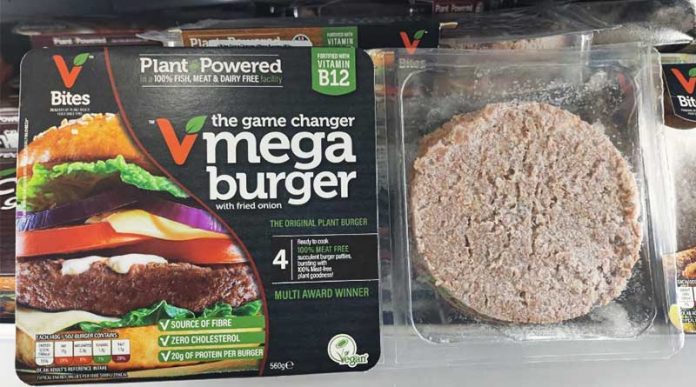A quick look at what veganism means to some people in the world, and how they view it in others.
By Abdulmuiz Nauman
DUBAI – When I walk around my local grocery store and see all the plant-based meat substitutes that are available, I always go back and think about what I was taught as a child. Growing up, I was always taught that humans had been designed to eat meat. That animals are incapable of feeling pain and that anyone who said otherwise was just plain wrong. I vehemently believed that this was the absolute truth and never once thought to even question it.
However, with vegan activism taking the stage on social media, I believe the message that consuming animal products is wrong is being relayed much clearer now. Not in the sense that everyone watching is becoming more averse to meat, which I’m sure is occurring at a smaller level, but that the seed of doubt is being planted in our minds. It is making us think and some people out there do not like it.
For those not aware, veganism is not just a diet. It is a lifestyle in which one cannot consume any products that come from animals. Meat, milk, eggs and honey are just a few of the dietary restrictions; however, vegans cannot wear leather, use beeswax candles or even some brands of makeup. In short, any product that comes from animals is off limits.
But what about the ethics of veganism? Are vegans really more ethical? Why isn’t everyone vegan? Well, these are very loaded questions, so I think some insight is necessary.
I asked American University of Sharjah student, Ibrahim Asaad, what he believes when it comes to ethicality and veganism, he said, “saying veganism is not ethical is fundamentally wrong. The non-vegan products that we consume, come from animals that are living in what are essentially factories and the second they lose their usefulness they’re “murdered.”
“You can’t actually be okay with eating that kind of meat, can you?” he said, despite not being a vegan himself.
University of British Columbia student Mustafa Malik came to a similar conclusion; however, he added that ethicality and veganism do not necessarily go hand in hand. It is his opinion that everyone’s definition of what ethical is, is different.
Now it is my belief that most people in the world would agree that veganism is the more humane alternative. And yet, there still is not that big of a following. Asaad seems to think this lack of veganism stems from culture.
As an Arab man, Asaad says that Arabic foods tend to be heavily reliant on meat, and even though he may want to move away from that, it becomes hard, especially after spending over two decades consuming animal products.
He also said that apart from the obvious dietary consequences of veganism, there are some less obvious social repercussions too, saying that it’s easy to feel excluded in a situation where everyone around you consumes meat, and you are the only one who does not. And this in turn makes veganism less attractive.
When I asked if he’s ever thought about becoming vegan, he said, “Of course I’ve thought about becoming vegan. It’s hard to not feel “icky” when you hear about the horrible things happening, and wilfully continuing to consume meat. It’s like you’re saying that whatever happens in those factories is okay. I might just be too comfortable where I am right now, but maybe one day in the future.”
Additionally, I spoke with Durham University law student, Saujanya Vinayy, who is a vegetarian by faith. She believes that being vegetarian is not something that she has ever had to think about, because that is how she was raised. However, even she does not believe that she could accept a life of pure veganism.
She said, “Dairy is an integral part of my diet. I understand that veganism may be seen as the more moral option, but unless dairy has an adverse effect on my body, I will not stop consuming it.”.
At this point I had asked two people with two very different dietary lifestyles, and to my surprise, they both reached the same conclusion. Now where does that leave us?
It is not as though practicing a vegan lifestyle is impossible. All around the world there are hundreds of plant-based substitutes available, and yet we still willingly consume meat. I was missing something. Maybe there are certain situations where eating meat is okay? So, I thought to myself, why not take things to the other extreme and ask about raising your own livestock for meat, milk and clothes?
Asaad said that raising your own livestock does not make it more ethical; however, it is more ethical than eating meat from factories. He believes that humans have evolved beyond the need to eat meat and that we don’t necessarily need to kill animals just to satisfy our desires. Near the end of his answer, he once again reiterated that raising your own livestock is not necessarily ethical, but it is more ethical than eating animals raised in factories.
Vinayy also weighed in on this. As she is a vegetarian, I was expecting her to have a strong opinion; however, she did not. She believes that everyone is entitled to believe what they want to believe. She said that if one wishes to raise their own animals for food, milk or any other products they can. But to say they are more ethical for doing so, that falls in a grey area.
I wasn’t sure what the outcome of my interviews was going to be. I was expecting more discourse and argument. I was surprised by the answers I got from everyone, but I guess in the end to each his own. I concluded that most people who consider meat as an integral part of their diets, find it more compelling to give it up, but at the same time much harder. For someone like Vinayy, who has never eaten any meat, I was surprised to learn her stance on the ethicality of raising your own livestock and that even she could not give up dairy.
And I do agree with my title. I do think vegans are the real murderers, because they’re slowly killing that small dark part of our minds that tells us it’s okay to hide behind our comfort, religion or tradition and continue to consume animal products. I truly believe that one day that society will completely evolve beyond the need for meat, even if, as Malik put it, “just tastes really good.” I think that the goal of vegan activism, that seed of doubt that they plant, is within all of us. We are exposed to that knowledge, but we still choose to ignore it. But who knows, maybe one day things will change?
To end, a quote by Sir Paul McCartney, “If slaughterhouses had glass walls, everyone would be vegetarian.”


















